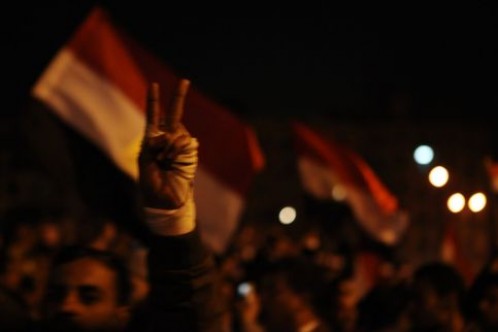Egypt’s Artists: ‘Bunch of Headless Chickens’?
 Youssef Rakha asks, in “Anticipating July 8?: “Should [Egypt’s] revolution pick up where it left off, now, what would be the intellectuals’ role in it?”
Youssef Rakha asks, in “Anticipating July 8?: “Should [Egypt’s] revolution pick up where it left off, now, what would be the intellectuals’ role in it?”
Rakha is fairly cynical about the role intellectuals have played thus far in helping Egypt come to grips with where we’ve been, where we are, and where we’re going. He calls for a more serious engagement, a move beyond surface rhetoric into painful realities.
Meanwhile, over at the new publication Rolling Bulb, Doa Ali ruminates on Laila Soliman’s most recent play, “No Time for Art,” and asks different questions about the relationship between artists and revolution. “Since the Revolution,” Ali writes, “Egyptian artists have been running about like headless chickens.”
Ali’s artists are different from Rakha’s intellectuals. She refers to artists who camped in Tahrir, whereas Rakha’s (more complicit, more writerly) intellectuals were largely onlookers. Ali argues that, all right, perhaps this wasn’t a time for art:
After a devastating bombing or a political victory, there’s no time for art. That is to say no time for contemplative reflection, for philosophy. It is time for action; solidarity or celebration, and anything else seems inappropriate. This explains the catatonic state of some artists, their inability to produce, to pick up where they left off, but in no way does it justify reactionary art disguised as political activism.
Although, as Ali moves on, she comes to the conclusion that perhaps engaging with art is inevitable, or even good:
It is dangerous at a time like this where we are expected to make the most use of our creative resources, to unlock our potential, to relinquish dogmas and have a broader understanding, to place the word No anywhere near the word Art.
Granted: Many artists and intellectuals have been unable to shake loose of their fears. But a number of artists, writers, publishers, book-vendors, poetry-lovers and others are jumping into the fire of creating and believing in a (truly) new Egypt. There are new publications like Rolling Bulb, new art forms, new publishing houses, new bookstores.
And the further we get from February 11, the harder the artists’ questions are getting. The more likely they are to acknowledge that, while the uprising was breathtaking, nothing much has changed (yet), that censorship abounds (here, here, here, here), that the relationship between human and state is still suffocating.
And we’ll see what July 8 brings.



You must be logged in to post a comment Login